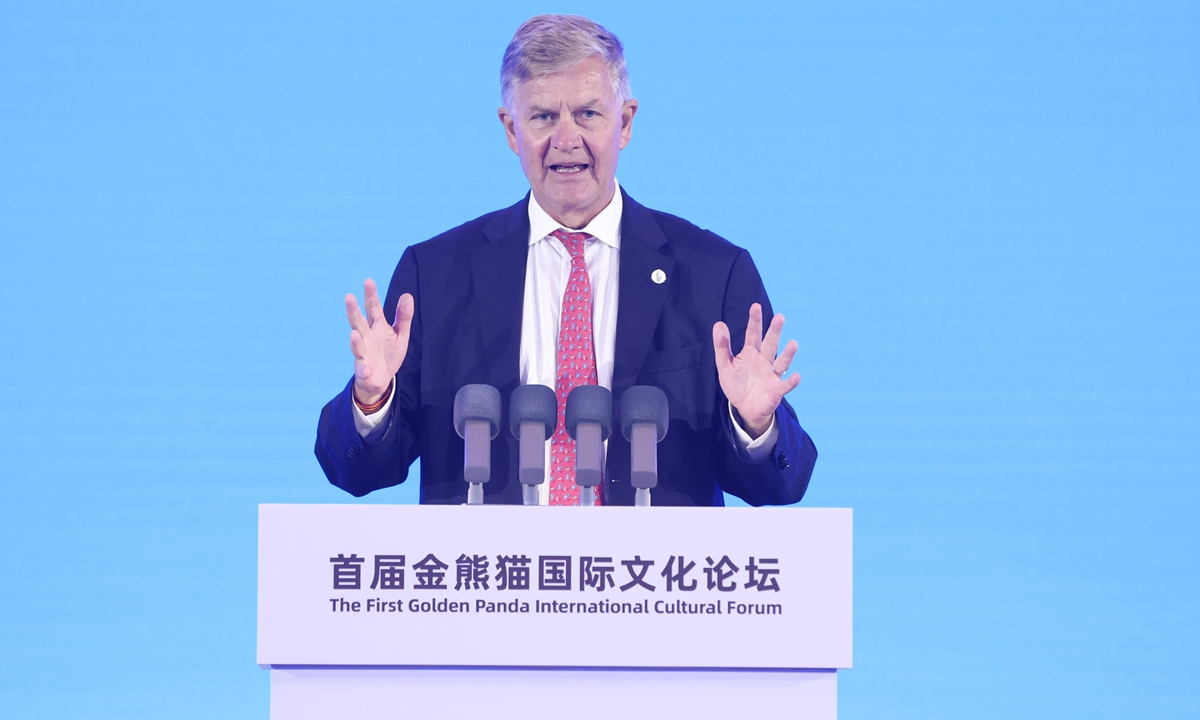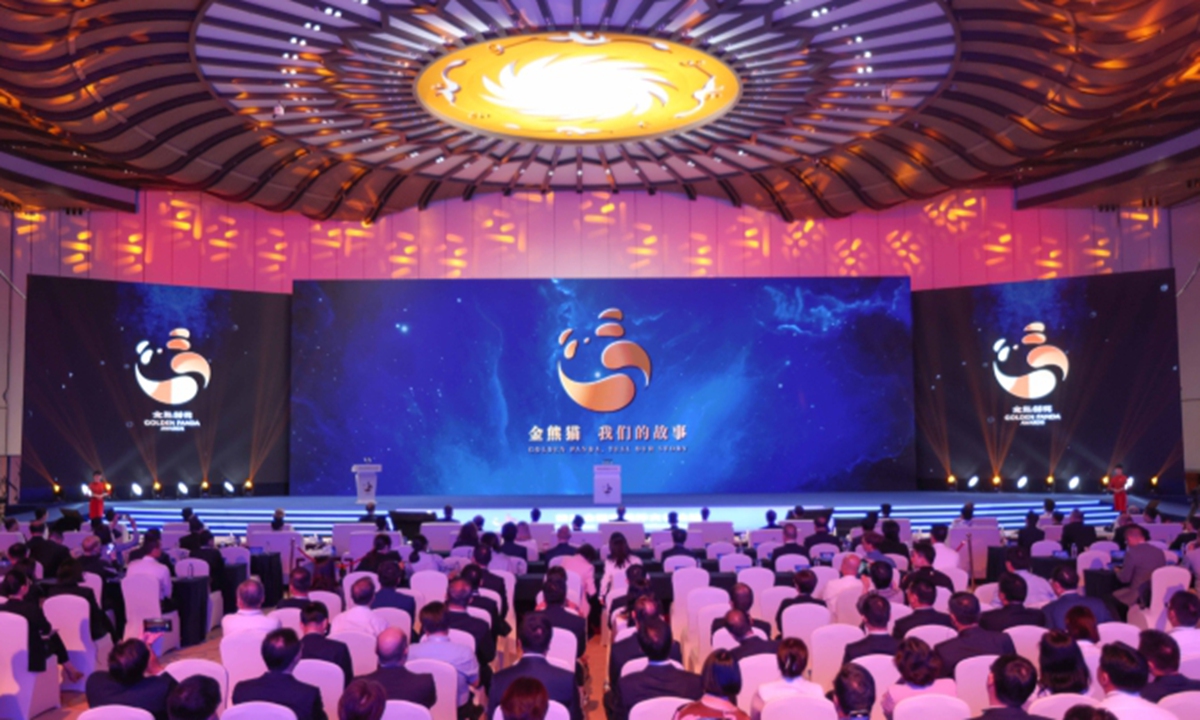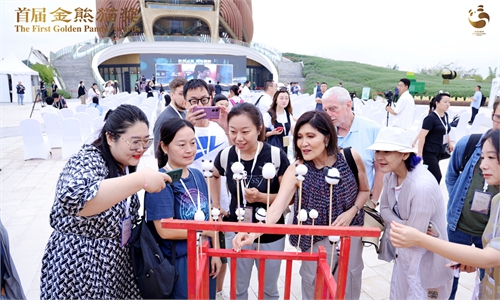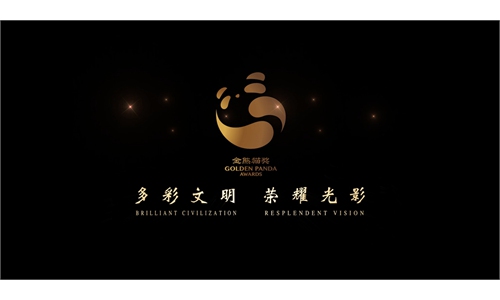ARTS / CULTURE & LEISURE
World needs cooperation, trust and exchanges, not decoupling, say global elite at First Golden Panda International Cultural Forum

Erik Solheim, former under-secretary-general of the United Nations Photo: Courtesy of Golden Panda Awards
"The world needs China and global cooperation," said Erik Solheim, a former under-secretary-general of the United Nations, on Wednesday in Chengdu, Southwest China's Sichuan Province, at the first Golden Panda International Cultural Forum.
In the 21st century, the world is facing challenges like creating an ecological civilization, avoiding climate change, protecting nature, increasing the economies after the pandemic... The world needs to work with China more than ever before as dialogues among different civilizations. "We need more, not less cooperation in the 21st century," he said, and called on all stakeholders to "combat all folly topics about the decoupling."
Xi Jinping, general secretary of the Communist Party of China (CPC) Central Committee, proposed the Global Civilization Initiative at the CPC in Dialogue with World Political Parties High-level Meeting in March.
Delivering a keynote address at the meeting, Xi, also Chinese president, stressed that tolerance, coexistence, exchanges and mutual learning among different civilizations play an irreplaceable role in advancing humanity's modernization process and making the garden of world civilization flourish, as the future of all countries is closely connected nowadays.
On Wednesday, Chengdu hosted the First Golden Panda International Cultural Forum to boost cultural exchanges and mutual learning with the theme, Civilizations in Harmony: Diversity, Equality and Inclusiveness.
Dialogue and exchanges
In the eyes of Irina Bokova, former director-general of UNESCO, the history of the Silk Road from Xi'an to Venice, through Bagdad, Samarkand, Palmyra, Nineveh or Balk and dozens more historic places and sites shows the achievements of great civilizations that mingled and influenced each other.
They bear the proof that "the dialogue among cultures, the fruitful exchange and the mutual respect between the East and the West had existed and had produced from the beginning, one of the best expressions that the humanity has," she said.
She added that the Global Civilization Initiative "reflects such a vision" and "strengthens China's leadership in promoting dialogue among civilizations, enhancing cultural diversity and building a harmonious world, providing a good solution for all of us to meet common challenges of humanity."

The first Golden Panda International Cultural Forum is held in Chengdu, Southwest China's Sichuan Province. Photo: Courtesy of Golden Panda Awards
In today's interconnected world where the destinies of countries are closely linked, the coexistence and mutual exchange of different civilizations are important drivers for advancing human civilization and promoting global peace. Former Foreign Minister of Egypt Nabil Fahmy believes that in the modern world it is not only important to understand what others are thinking but also why they think the way they do in his speech "Promoting world peace through cultural exchange."Wu Weishan, a renowned sculpture artist and curator of National Art Museum of China, has created a series of sculpture works with the theme of dialogue between China and foreign countries.
A Dialogue across Time, consists of two bronze sculptures depicting Italian Renaissance figure Leonardo da Vinci (1452-1519) and modern Chinese artist Qi Baishi (1864-1957) engaged in a sort of hypothetical conversation transcending time and geographical distance, symbolizing cultural and artistic exchanges between China and Italy.
"It is like two towering trees rooted in the soil of human civilization, forming a scene of complementary civilizations with different branches and leaves," said Wu.
The one between ancient Chinese philosopher Confucius and ancient Greek philosopher Socrates stands in Agora Square in Athens, Greece. Confucius resembles the spring breeze, bending down and saluting, carrying the friendship of the ancient Oriental country and the great vision of a world of benevolence. He started an Axial Age dialogue with Socrates, who advocated the unity of beauty and goodness.
For a better world
The number of giant pandas continues to grow after decades of protection. Pandas, China's national treasure, can be seen by more and more people around the world today. After a panda tour in Southwest China's Sichuan Province, Abhisit Vejjajiva, former prime minister of Thailand, drew a parallel between animals and humans and questioned why we can work together to save pandas from extinction but can't work together to rebuild trust for peace and common prosperity.
"Art is universal language and culture is what unifies us," said Irina.
As one kind of art form, movies can bridge different civilizations and peoples with shared feelings, emotions and worldview. Chinese Hong Kong director and producer Stanley Tong said that movies not only help Chinese people know the outside world, but also help Chinese story step on the global stage with efforts from Chinese stars like Bruce Lee, Jackie Chan and Jet Li.
The Golden Panda Initiative from artists of different ethnicities and languages was also released at the forum to make the world a better place. Embrace the mission of promoting a harmonious and mutually beneficial civilization in this era; collaboratively create artistic monuments that reflect shared values; act as friendly ambassadors of cultural exchange and mutual learning; continuously unleash the youthful energy of cultural heritage and innovation.
On Wednesday night, Argentine actor Nahuel Pérez Biscayart won the Best Actor award at the inaugural Golden Panda Awards for his role as Gilles in war drama film Persian Lessons.
The Best Actress award went to Spanish actress Penelope Cruz for her role in Spanish drama film Parallel Mothers, which tells a story of two mothers who bond in unexpected way after giving birth on the same day.
Comedy-drama film Jojo Rabbit, which tells the story of the final days of World War II through the eyes of a child, won the Best Film award.
US drama television series 1923 season 1, which depicts the challenges the US faced in the early 20th century, won the Best TV Drama award.
Documentary The Miracle Panda, coproduced by China and the US which narrates the giant panda program between the two countries, won the Best Documentary award.




